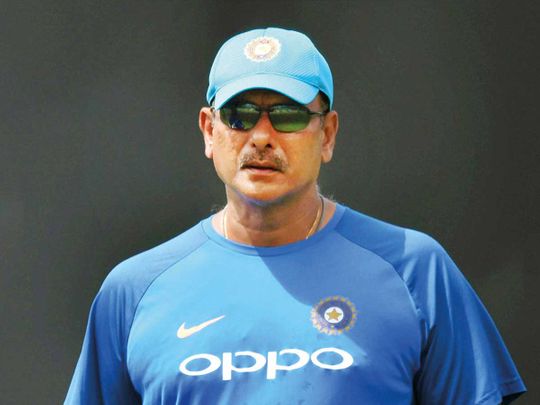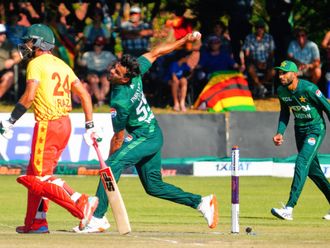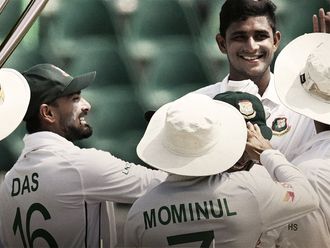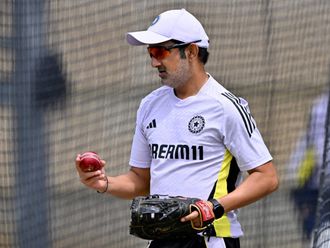
Dubai: It would have been a miracle of sorts if Ravi Shastri had not eventually received the extension for the head coach’s post for another two years. The decision, though it came after another exercise in much-ado-about-nothing that Indian cricket fans are used to in recent times, is more of an endorsement of belief in continuity as well as catering to the comfort zone of skipper Virat Kohli.
If there was a greater element of suspense and drama prevailing two years back when Shastri eventually made a comeback after the unceremonious exit of Anil Kumble, the decision to stick with him was an open-and-shut case this time around. At least one of the members of the previous Cricket Advisory Committee, comprising of the trio of Sachin Tendulkar, Sourav Ganguly and V.V.S. Laxman (no prizes for guessing) was not inclined in bringing Shastri back — but they had to relent and give in to the wishes of the captain.
As the former Indian all-rounder-TV pundit-coach takes a fresh guard for an unprecedented third coming, one has to admit that it’s not always easy to be in the shoes of Shastri. Yes, the princely perks of being the Indian coach can certainly offset the status of being one of the most trolled persons in the social media off and on — and he himself admitted to developing a thick skin as he grew into the job.
“I sleep very well … I come from an era when the media would exist in the way of one or two newspapers. I may be on Twitter and Instagram but I hardly read anything there,” a candid Shastri had told Gulf News during an exclusive interview at our office in Dubai last year.
What is his contribution as a coach to Indian cricket?
The all-important question that begs to be asked here is: how much has Shastri actually contributed in the journey of Indian cricket during a cumulative tenure of four years? Does he have it in him to infuse the team with fresh ideas — which they now need to do well overseas as well as to stop the so-near-yet-so-far syndrome in major ICC tournaments?
Asked about his philosophy of coaching — where Shastri is often perceived to be pursuing a live and let live approach — he said in the same interview: “It’s all about man management. You have to remember that you are dealing with millionaires and not just normal athletes, so you have to give them the space but at the same time be strict when the occasion demands.”
To be fair to Shastri, the intelligence from the dressing room is there are no dearth of examples where his sharp cricketing brain had been at play to shape strategies over the last few years. A major example was his decision — with a buy-in from the skipper — to revolutionise their spin attack in white ball cricket with two wrist spinners Kuldeep Yadav and Yuzvendra Chahal with an eye towards the recent 50-overs World Cup. Then as a commentator, Shastri had noticed that the finger spinners Ravi Ashwin and Ravindra Jadeja had been leaking too many runs in the middle overs during the 2017 Champions Trophy in England and hit upon this novel idea which played a key role in the team’s success rate in this format.
The idea of thrusting Jasprit Bumrah — till then considered as a white ball specialist — into Tests during the South Africa tour of 2017-18 to make use of his skid and bounce off the wickets had also been a brainchild of the often much maligned head coach. However, there have been policies of the Shastri-Kohli combination of not reaching out to the best available expert advice within the country — which had proved counterproductive in the long run.
If Shastri’s dependence on Bharat Arun as the bowling coach — given the latter’s experience — had been extremely rewarding in terms of keeping the pace bowling attack fit and effective, the same cannot be said about their batting performance overseas. The suggestion by the earlier CAC to rope in the services of Rahul Dravid, especially for demanding foreign tours, was never seriously heeded as the team management kept their faith on Sanjay Bangar despite being aware of his limitations.
Fresh tenure, fresh challenges
Looking ahead, the challenge before Shastri is possibly tougher as he has to now reinvent the wheel. The World Cup, in a popular sport like cricket or football, is usually seen as a watershed in any professional coach’s career — after which they look to turn leaf with a new assignment unless they are removed altogether. Trevor Bayliss, the coach of world champions England will be gone after The Ashes as per contract while Pakistan’s Mickey Arthur’s contract is not being renewed — ostensibly under the directives of Prime Minister Imran Khan.
Shastri, to that measure, had been lucky to be entrusted with the top job once again. He has to take the tough call on Mahendra Singh Dhoni, fill in the obvious loopholes in the one-day team — apart from meeting the expectations day in and day out from the legion of demanding fans.
We will wait and watch to find out if he can deliver.












